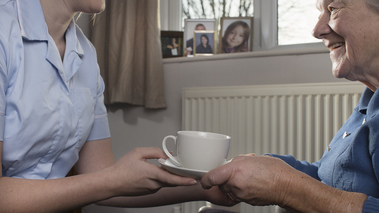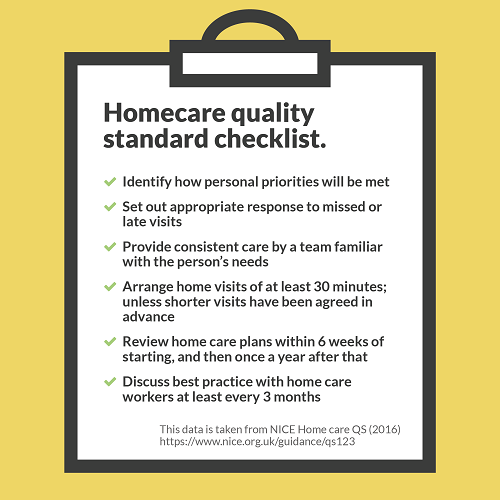National Institute for Health and Clinical Excellence (NICE)
|
|
Improving home care services for older people
Home care services need to prioritise older people’s needs and wishes so they are treated with dignity, a new NICE quality standard says.

NICE has issued a new quality standard which highlights how social care providers can help older people maintain their independence for as long as possible.
Around 470,000 people used local authority funded home care services in England last year. The majority of these will be people aged over 65 years old.
The new quality standard encourages providers to ditch the ‘one size fits all’ approach. It says that home care plans should describe what each person wants and how their needs will be met. Family members and carers should be involved in the decision process if possible.
Enough time should be given so that what they want can be achieved in a way that does not compromise their dignity and wellbeing.
Missed visits can have serious implications for older people
The standard says providers should ensure a back-up plan is in place so that the older person stays safe and their carers are kept informed.
Continuity of home care workers is another priority for delivering person-centred care.
If home workers get to know the person they are caring for, they understand them and their needs. In turn it builds the person’s confidence in the service and instils a sense of safety.
Bridget Warr, chief executive of the UK Homecare Association echoed this statement in the standard and said: “Providing consistent care is vital, so having a team that is well versed and familiar with an individual’s needs means that high-quality person-centred care can be delivered.”

A report from trade union UNISON earlier this year revealed that almost three quarters (74%) of councils were limiting home care visits to just 15 minutes. And in the majority of cases home workers were being asked to carry out activities such as helping people to wash or preparing a meal in that short time.
The standard highlights there is a risk shorter visits will be rushed and not meet a person’s needs, compromising on safety and dignity. Shorter visits should only be used in carefully considered circumstances. For instance when a home care worker is well known to the person or if they have been agreed in advance.
Home care spending in England amounted to £1.4 billion for adults aged over 65 in 2014-15.
The standard includes priorities for home care providers to make sure they use their staff effectively.
Workers should have their practice observed at least every 3 months with feedback discussed. Regular supervision will help improve the way they work and can reduce staff turnover helping to ensure older people build relationships with their carers.
The ageing population continues to increase. Estimates predict that almost 1 in 4 people in England will be over 65 by 2035. The new quality standard will help providers deliver high-quality home care services for older people at a time when demand for such services is set to grow.
The quality standard sets out the key areas to prioritise from the NICE guideline which was published last year.


.gif)